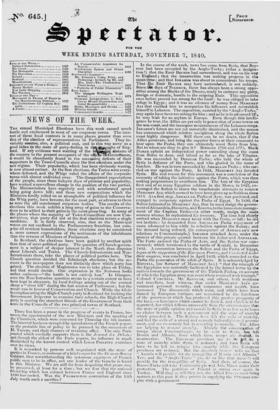---- NEWS OF THE WEEK.
THE annual Municipal Elections have this week caused much bustle and excitement in most of our corporate towns. The inte-
rest of these local contests is -in many places greater than even that of the 'election of representatives in Parliament. They in- variably assume, also, a political cast, and in this 5vay serve as a
good index -to the state of party-feeling in t. lopiughs of Eng- land. If any evidence were wanting of the ' ' g distaste of the country to the present occupants of the AC .s 'Goveratnent,
it would be abundantly found in the succaiiiiva, defeats of their supporters in the Town-Councils since the first elections under the new regime. Their popularity, which has been obviously waning, is now almost extinct. At the first elections, the Tories were every- where defeated, and the Whigs ruled the affitirs of the corporate towns with almost undivided sway. The disappointed expectations Of the people, since those halcyon days of promise and popularity, have a marvellous change in the position of the two parties. The Ministerialists have regularly and with accelerated speed being going down hill; and those new corporations which the Ministers fondly relied on as strongholds of political influence for the Whig party, have become, for the most part, as adverse to them
as were the -old unreformed corporate bodies. The results of the elections this week exhibit a long array of gains to the Conserva-
tives to be added to their gains in the years preceding. In many of the places where the majority of Town-Councillors are now Con- servatives, that party did not at the first elections return a single candidate. It is fairly observed, also, that as the Municipal voters are not confined to the Parliamentary franchise, but corn- rise all resident householders, these elections may be considered a4 more correct expressions of the sentiments of the inhabitants than the returns of' Members of Parliament.
In Scotland, the elections have been guided by another spirit than that of mere political party. The question of Church-govern- ment is a subject of deeper interest in the North than disputes about Liberals and Tories. The Church-Intrusionists and Non- Intrusionists there, take the places of political parties here. The Church question decided the Edinburgh elections; but the ac- count in the newspapers does not distinctly show which party has gained. The election of Magistrates was to take place on Friday, and that would decide. One expression in the Scotsman looks rather ominous—" the battle is not entirely lost." In Glasgow, even the Non-Intrusion question seems to a certain extent to have been kept in abeyance, by local feelings arising out of the contest about a " river bill" during the last session of' Parliament ; but the result was in favour of Conservatism and Church. While the Globe IS complimenting: the High-Church party in Scotland for inviting the Government inspector to examine their schools, the High-Church party is ousting the stanchest friends of the Government from their seats in the Councils of the two principal towns of Scotland.


























